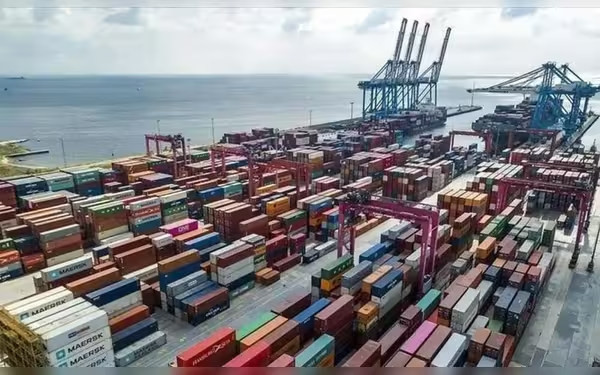Sunday, December 22, 2024 04:22 AM
MoC Directs Provinces to Develop Export Growth Strategies
- Provinces urged to create export development plans.
- Collaboration with Chinese experts for agricultural exports initiated.
- Infrastructure Development Cess impacts export competitiveness.
 Image Credits: brecorder
Image Credits: brecorderThe Ministry of Commerce urges provinces to develop export strategies to enhance Pakistan's economic growth and competitiveness.
In a significant move aimed at boosting Pakistan's export capabilities, the Ministry of Commerce (MoC) has urged provincial governments to initiate discussions for the formulation of provincial export development plans. This directive was issued during a meeting of the Executive Committee of the National Export Development Board (NEDB), chaired by Commerce Minister Jam Kamal. The focus is on creating a structured approach to enhance exports, which are vital for the country’s economic growth.
The MoC has emphasized the importance of establishing focal committees within provincial government departments, which should be led by senior provincial ministers. This collaborative effort is expected to streamline the process of developing export strategies tailored to the unique strengths and resources of each province. Furthermore, the MoC, along with other relevant federal ministries, has pledged to support these provincial initiatives.
During the meeting, provincial departments were instructed to relay feedback from consultations held with sectoral councils to their respective Chief Secretaries. This feedback is crucial as it reflects the concerns and suggestions of local businesses, which are essential for crafting effective export plans. The Commerce Minister expressed concern over the delayed responses from various ministries regarding issues raised by businessmen, highlighting a need for more prompt and constructive communication.
In addition to addressing existing issues, the meeting also reviewed the outcomes of discussions from 16 Sectoral Councils, which actively involved provincial representatives. The Commerce Minister underscored the pivotal role provinces play in the export economy, noting that the benefits of a robust export sector will be most pronounced at the provincial level.
On the topic of collaboration with Chinese experts to enhance agricultural exports, the MoC revealed that the responsibility for this initiative has been transferred to the National Seed Development & Regulatory Authority (NSDRA). However, it was noted that no meetings have been convened to date, raising concerns about the progress of this important collaboration.
Moreover, the Commerce Ministry clarified that there is no ban on the export of value-added wheat products, despite the Cereal Association of Pakistan's focus on exporting wheat as a commodity. This distinction is vital for understanding the potential for expanding Pakistan's agricultural export portfolio.
Addressing logistical challenges, the Commerce Ministry is actively seeking updates from the Ministry of Maritime Affairs regarding shipping and delivery time issues. These logistical hurdles are critical to ensuring that exporters can compete effectively in international markets.
The meeting also presented a sectoral roadmap for agriculture, which was developed based on consultations with three Sectoral Councils. This roadmap identifies key challenges such as energy tariffs, import tariffs on capital goods, and the need for improved infrastructure. A comprehensive action plan was proposed for five main agricultural sectors: rice, fruits and vegetables, dairy products, meat, and fisheries, with specific interventions and responsibilities assigned to various stakeholders.
One of the pressing issues discussed was the Infrastructure Development Cess (IDC) imposed by the governments of Sindh and Khyber Pakhtunkhwa. The Commerce Ministry highlighted how this cess negatively impacts the competitiveness of exporters. In response, the Chief Ministers of both provinces were urged to reconsider the imposition of the IDC, which is seen as a barrier to export growth.
The proactive steps taken by the Ministry of Commerce and the provincial governments signal a commitment to enhancing Pakistan's export landscape. By fostering collaboration and addressing key challenges, there is potential for significant growth in the export sector, which will ultimately benefit the economy and create more opportunities for local businesses. As these plans unfold, it will be crucial for all stakeholders to remain engaged and responsive to the evolving needs of the export market.













